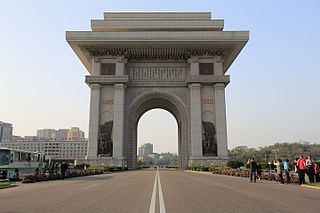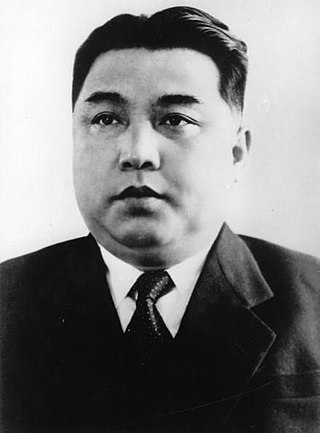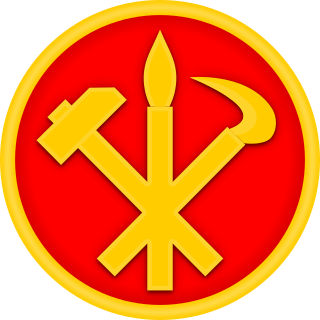| |||||
| Centuries: | |||||
|---|---|---|---|---|---|
| Decades: | |||||
| See also: | Other events of 2009 Years in North Korea Timeline of Korean history 2009 in South Korea | ||||
The following lists events that happened in 2009 in North Korea .
| |||||
| Centuries: | |||||
|---|---|---|---|---|---|
| Decades: | |||||
| See also: | Other events of 2009 Years in North Korea Timeline of Korean history 2009 in South Korea | ||||
The following lists events that happened in 2009 in North Korea .

North Korea, officially the Democratic People's Republic of Korea (DPRK), is a country in East Asia. It constitutes the northern half of the Korean Peninsula and borders China and Russia to the north at the Yalu (Amnok) and Tumen rivers, and South Korea to the south at the Korean Demilitarized Zone. The country's western border is formed by the Yellow Sea, while its eastern border is defined by the Sea of Japan. North Korea, like its southern counterpart, claims to be the legitimate government of the entire peninsula and adjacent islands. Pyongyang is the capital and largest city.

Pyongyang is the capital and largest city of the Democratic People's Republic of Korea (DPRK), commonly known as North Korea, where it is sometimes labeled as the "Capital of the Revolution". Pyongyang is located on the Taedong River about 109 km (68 mi) upstream from its mouth on the Yellow Sea. According to the 2008 population census, it has a population of 3,255,288. Pyongyang is a directly administered city with a status equal to that of the North Korean provinces.

Kim Jong Il was a North Korean politician who was the second supreme leader of North Korea. He led North Korea from the death of his father Kim Il Sung in 1994 until his death in 2011, when he was succeeded by his son, Kim Jong Un. Afterwards, Kim Jong Il was declared Eternal General Secretary of the WPK.

Juche, officially the Juche idea, is the state ideology of North Korea and the official ideology of the Workers' Party of Korea. North Korean sources attribute its conceptualization to Kim Il Sung, the country's founder and first leader. Juche was originally regarded as a variant of Marxism–Leninism until Kim Jong Il, Kim Il Sung's son and successor, declared it a distinct ideology in the 1970s. Kim Jong Il further developed Juche in the 1980s and 1990s by making ideological breaks from Marxism–Leninism and increasing the importance of his father's ideas.
The Korean People's won, more commonly known as the North Korean won and sometimes known as the Democratic People's Republic of Korea won, is the official currency of North Korea. It is subdivided into 100 chon. The currency is issued by the Central Bank of the Democratic People's Republic of Korea, based in the North Korean capital city of Pyongyang.

Kim Jong-nam was the eldest son of North Korean leader Kim Jong Il. From roughly 1994 to 2001, he was considered the heir apparent to his father. He was thought to have fallen out of favour after embarrassing the regime in 2001 with a failed attempt to visit Tokyo Disneyland with a false passport, although Kim himself said his loss of favour had been due to advocating reform.

The Korean Central News Agency (KCNA) is the state news agency of North Korea. The agency portrays the views of the North Korean government for both domestic and foreign consumption. It was established on December 5, 1946, and now features online coverage.

Kim Il Sung University (Korean: 김일성종합대학) is a university in Taesong, Pyongyang, North Korea. Founded on 1 October 1946, it is the first institution of higher learning in North Korea since its foundation.

The Arch of Triumph is a triumphal arch in Pyongyang, North Korea. It was built to commemorate the Korean resistance to Japan from 1925 to 1945. It is the second tallest memorial arch in the world, after Monumento a la Revolución in Mexico, standing 60 m (197 ft) high and 50 m (164 ft) wide.

The cinema of North Korea began with the division of Korea and has been sustained since then by the ruling Kim dynasty. Kim Il-sung and his successor Kim Jong-il were both cinephiles and sought to produce propaganda films based on the Juche ideology.

Kim Jong Un is a North Korean politician who has been supreme leader of North Korea since 2011 and the leader of the Workers' Party of Korea (WPK) since 2012. He is the third son of Kim Jong Il, who was the second supreme leader of North Korea, and a grandson of Kim Il Sung, the founder and first supreme leader of the country.

The Workers' Party of Korea (WPK) is the sole ruling party of the Democratic People's Republic of Korea, commonly known as North Korea. Founded in 1949 from a merger between the Workers' Party of North Korea and the Workers' Party of South Korea, the WPK is the oldest active party in Korea. It also controls the Korean People's Army, North Korea's armed forces. The WPK is the largest party represented in the Supreme People's Assembly and coexists with two other legal parties that are completely subservient to the WPK and must accept the WPK's "leading role" as a condition of their existence. The WPK is banned in the Republic of Korea under the National Security Act and is sanctioned by the United Nations, the European Union, Australia, and the United States.

Kim Il Sung was a North Korean politician and the founder of North Korea, which he led as Supreme Leader from the country's establishment in 1948 until his death in 1994. Afterwards, he was declared eternal president.
Room 39 is a secretive North Korean party organization that seeks ways to maintain the foreign currency slush fund for the country's leaders.

Propaganda is widely used and produced by the government of the Democratic People's Republic of Korea. Most propaganda is based on the Juche ideology, veneration of the ruling Kim family, the promotion of the Workers' Party of Korea, and hostilities against both the Republic of Korea and the United States

Kim Il-chol was a North Korean military officer who was a member of the National Defence Commission and Minister for Defence.

The Kim family, also known as the Kim dynasty or the Mount Paektu bloodline in the ideological discourse of the Workers' Party of Korea (WPK), is a three-generation lineage of North Korean leadership, descending from the country's founder and first leader, Kim Il Sung. The patriarch came to rule the north in 1948, after the end of Japanese rule split the region in 1945. He began the Korean War in 1950, in a failed attempt to reunify the Korean Peninsula. In the 1980s, Kim Il Sung developed a cult of personality closely tied to the North Korean state philosophy of Juche. Following his death in 1994, Kim Il Sung's role as supreme leader was passed on to his son Kim Jong Il, and then to his grandson Kim Jong Un. All three men have served as leaders of the WPK and have exercised absolute control over North Korea since the state's establishment in 1948.

On the Art of the Cinema is a 1973 treatise by the North Korean leader Kim Jong Il. It is considered the most authoritative work on North Korean filmmaking.

The Propaganda and Agitation Department, officially translated as the Publicity and Information Department, is a department of the Central Committee of the Workers' Party of Korea (WPK) tasked with coordinating the creation and dissemination of propaganda in North Korea. It is the highest propaganda organization in the country.